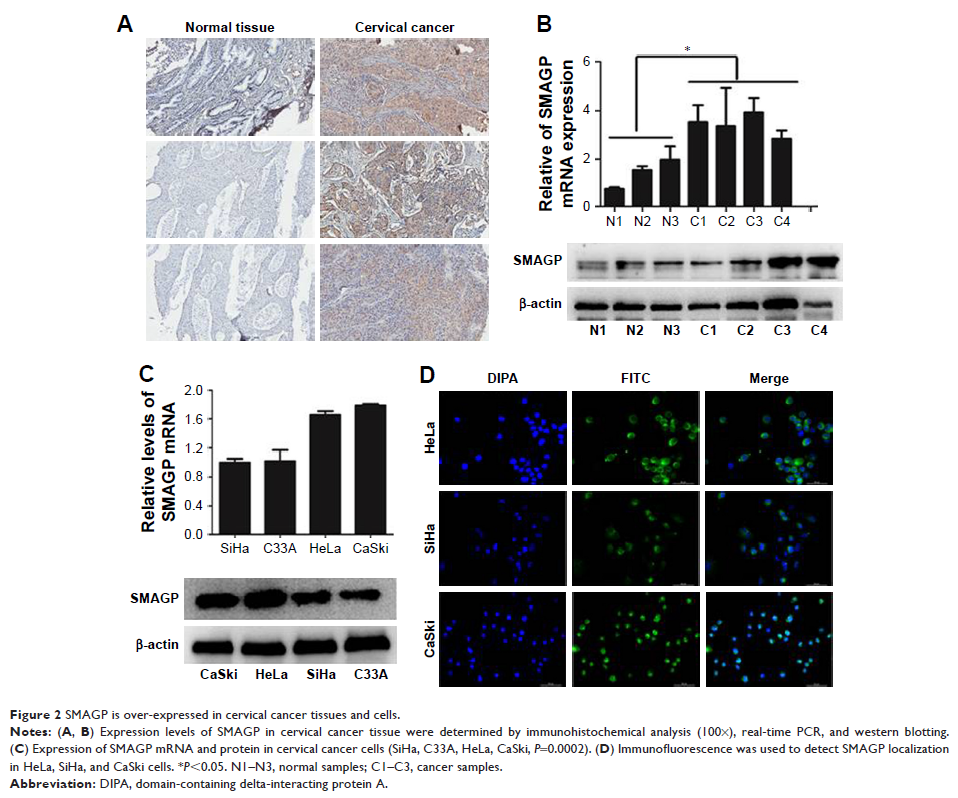108605
论文已发表
注册即可获取德孚的最新动态
IF 收录期刊
- 3.4 Breast Cancer (Dove Med Press)
- 3.2 Clin Epidemiol
- 2.6 Cancer Manag Res
- 2.9 Infect Drug Resist
- 3.7 Clin Interv Aging
- 5.1 Drug Des Dev Ther
- 3.1 Int J Chronic Obstr
- 6.6 Int J Nanomed
- 2.6 Int J Women's Health
- 2.9 Neuropsych Dis Treat
- 2.8 OncoTargets Ther
- 2.0 Patient Prefer Adher
- 2.2 Ther Clin Risk Manag
- 2.5 J Pain Res
- 3.0 Diabet Metab Synd Ob
- 3.2 Psychol Res Behav Ma
- 3.4 Nat Sci Sleep
- 1.8 Pharmgenomics Pers Med
- 2.0 Risk Manag Healthc Policy
- 4.1 J Inflamm Res
- 2.0 Int J Gen Med
- 3.4 J Hepatocell Carcinoma
- 3.0 J Asthma Allergy
- 2.2 Clin Cosmet Investig Dermatol
- 2.4 J Multidiscip Healthc

SMAGP 是一种新的宫颈癌发生和发展的生物标志物
Authors Jia Y, Li H, Liu G, Song F
Received 30 May 2018
Accepted for publication 18 July 2018
Published 15 October 2018 Volume 2018:11 Pages 6925—6935
DOI https://doi.org/10.2147/OTT.S175808
Checked for plagiarism Yes
Review by Single-blind
Peer reviewers approved by Dr Colin Mak
Peer reviewer comments 2
Editor who approved publication: Dr William Cho
Introduction: Cervical cancer, one of the most common malignant gynecological tumors,
is a significant burden on the health of females worldwide. The purpose of this
study was to investigate genes associated with lymph node metastasis in
cervical cancer.
Methods: We report on the lymph node metastasis-associated gene, small cell
adhesion glycoprotein (SMAGP), as a key regulator of cervical cancer
development and progression. SMAGP expression levels were investigated in 70
cervical squamous cell carcinoma samples and 10 normal cervical squamous
epithelium samples.
Results: Immunohistochemistry analysis revealed that SMAGP protein levels were
significantly elevated in cervical cancer tissue compared with normal cervical
squamous epithelium. Silencing of SMAGP induced cell cycle arrest, inhibited
the cell proliferation and colony formation ability of cervical cancer cells in
vitro and suppressed their tumorigenic potential in nude mice. In addition,
SMAGP knockdown reduced expression of epithelial mesenchymal transition-related
proteins, including vimentin, β-cadherin, MMP2, and Twist.
Conclusion: Together, our findings demonstrate that SMAGP plays a critical role in
cell proliferation and tumorigenesis and could be a new therapeutic target in
cervical cancer.
Keywords: cervical cancer, small cell adhesion glycoprotein, bioinformatics, cell
cycle
